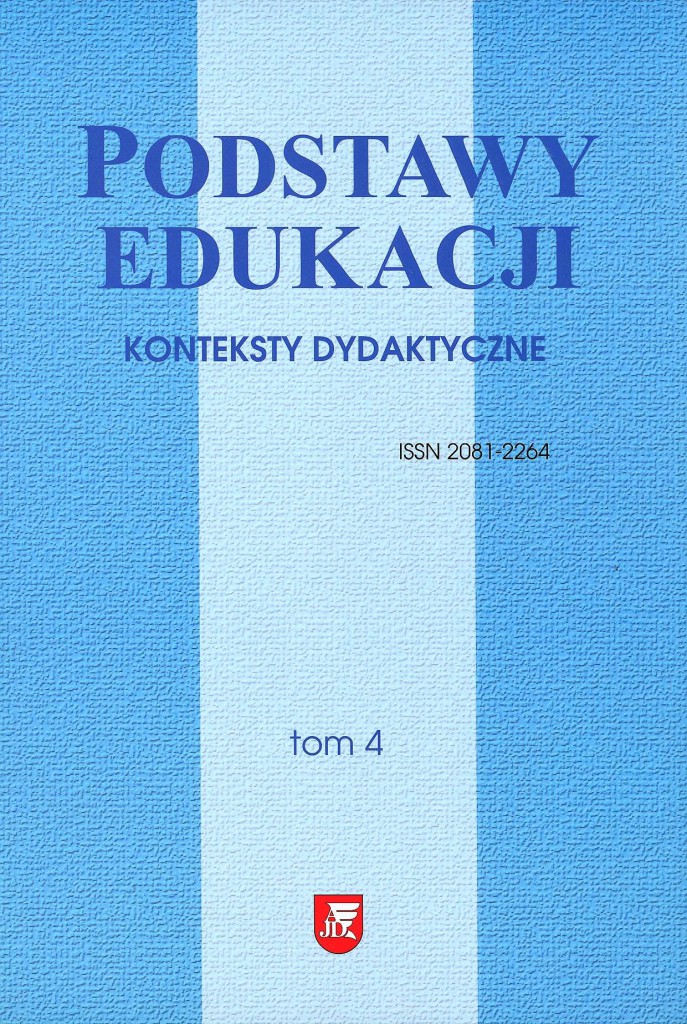Abstract
The article entitled Social aspects of gaining and transferring knowledge is a theoretical development of consequences resulting from current concepts of knowledge „without adjectives” – the most general depiction – L. Wittgenstein’s position, for analysis of educational processes and practise of contemporary school. Thus topic of the article lies between philosophy, pedagogy (social pedagogy) and didactics. That’s why knowledge is analysed from several chosen perspectives concentrated over various issues and categories connected by common social context of knowledge: on language, communication and social level. Knowledge should be treated as something more than just a sum of information but as a complex system of interpretation of the world getting shape along with the process of gaining communicational competences by students. Dialog should not be a tool for creating students’ cognitive uniformity, but a tool for creating differences. Thus, excessive formality of interactions between a teacher and a student, which is a characteristic feature of contemporary school, decreases effectiveness of gaining those competences. It shows critical image of authoritarian transfer of knowledge that dominates in educational practise of school. The author postulates greater caution should be attached to function of language and dialog forms of education (accepting common language, rejecting schematisation, creating space for free communication between students, acceptance of mistakes, errors and formal imperfections).
References
Andrukowicz, W. (2001). Edukacja integralna. Kraków.
Aronovitz, S., Giroux, H.A. (1991). Postmodern Education: Politics, Culture and Social Criticism. Minneapolis, MN.
Augustyn, św. (1953). O nauczycielu. J. Modrzejewski (tłum.). W: Św. Augustyn. Dialogi filozoficzne. T. 3. Warszawa.
Bartley, W. (1974). Theory of Language and Philosophy of Science as Instruments of Educational Reform: Wittgenstein and Popper as Austrian Schoolteachers. W: W. Wartofsky (red.). Methodological and Historical Essays in the Natural and Social Sciences. Boston Studies in the Philosophy of Science. Dordrecht.
Bloor, D. (1976). Knowledge and Social Imagery. Londyn.
Bloor, D. (1983). Wittgenstein. A Social Theory of Knowledge. Nowy Jork.
Freire, P. (1989). The Politics of Education. W: P. Murphy, B. Moon (red.). Developments in Learning and Assessment. Londyn.
Freire, P. (1985). The Politics of Education. South Hadley (MA).
Gergen, K.J. (1985). Social Psychology and the Wrong Revolution. European Journal of Social Psychology, 19.
Gergen, K.J., Shotter J. (1994). Social Construction: Knowledge, Self, Others, and Continuing the Conversation. Communication Yearbook, 17.
Hacker, P.M.S. (1998). Wittgenstein. J. Hołówka (tłum.). Warszawa.
Hacker, P.M.S., Finch, H.R. (1996). Metafizyka jako cień gramatyki. Późna filozofia Ludwiga Wittgensteina. Wybór tekstów. A. Chmielewski, A. Orzechowski (red.). A. Chmielewski i in. (tłum.). Wrocław.
Katz, A.M., Shotter, J. (1996). Articulating a Practice from within the Practice Itself: Establishing Formative Dialogues by the Use of Social Poetics. Concepts and Transformations, 2.
Klus-Stańska, D. (2002). Wiedza ucznia w nauczaniu zintegrowanym – od formalistyki do konstruowania znaczeń. W: E. Malewska, B. Śliwerski (red.). Pedagogika i edukacja wobec nowych wspólnot i różnic w jednoczącej się Europie. Kraków.
Nalaskowski, S. (1996). Humanizm i podmiotowość w wychowaniu. Na przykładzie szkolnych systemów w Polsce. Toruń.
Ostrowska, U. (2000). Dialog w pedagogicznym badaniu jakościowym. Kraków.
Pears, D. (1999). Wittgenstein. K. Gurczyńska, J. Gurczyński (tłum.). Warszawa.
Prawat, R.S., Floden, R.E. (1994). Philosophical Perspectives on Constructivist Views of Learning. Educational Psychologist, 29(1).
Sady, W. (1982). Co to znaczy, że coś istnieje? Studia Filozoficzne, 11–12.
Sady, W. (2000). Spór o racjonalność od Poincarego do Laudana. Wrocław.
Schlick, M. (1993). Znaczenie i weryfikacja. W: H. Buczyńska-Garewicz. Koło Wiedeńskie. Toruń.
Shotter, J. (1984). Social Accountability and Selfhood. Oxford.
Shotter, J. (1996). Living in a Wittgensteinian World: Beyond Theory to a Poetics of Practices. Journal for the Theory of Social Behaviour, 26.
Trzebiński, J. (2002). Narracja jako sposób rozumienia świata. Gdańsk.
Winch, P. (1995). Idea nauki o społeczeństwie i jej związki z filozofią. B. Chwedeńczuk (tłum.). Warszawa.
Wittgenstein, L. (1969). The Blue and Brown Books. Oxford.
Wittgenstein, L. (1980). Remarks on the Philosophy of Psychology. Oxford.
Wittgenstein, L. (1985). Dociekania filozofi czne. B. Wolniewicz (tłum.).Warszawa.
Wittgenstein, L. (1990). Last Writings on the Philosophy of Psychology, Chicago.
Wittgenstein, L. (1993). O pewności. M. Sady, W. Sady (tłum.). Warszawa.
I am aware that the journal is published under the Creative Commons Attribution License (https://creativecommons.org/licenses/by/4.0/legalcode).
By submitting an article, I agree to make it available under this license.
